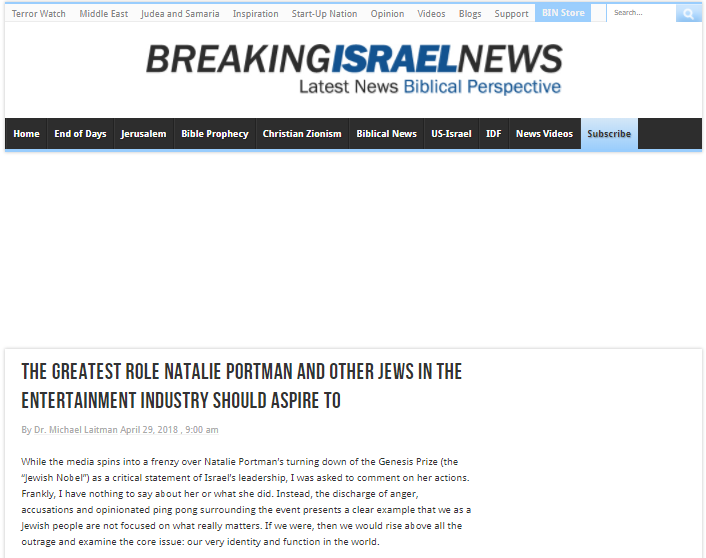
While the media spins into a frenzy over Natalie Portman’s turning down of the Genesis Prize (the “Jewish Nobel”) as a critical statement of Israel’s leadership, I was asked to comment on her actions. Frankly, I have nothing to say about her or what she did. Instead, the discharge of anger, accusations and opinionated ping pong surrounding the event presents a clear example that we as a Jewish people are not focused on what really matters. If we were, then we would rise above all the outrage and examine the core issue: our very identity and function in the world.
It’s no secret that the media thrives on generating hysteria by amplifying celebrities’ insignificant comments into wildfires of public opinion. What should we ask ourselves is why do we enjoy it so much? Why do we let ourselves get swept into this socially divisive snowball effect? Why don’t we enjoy in more socially beneficial ways, by engaging in the creation of a more positively connected society?
Actors Had Far Less Influence in the Past
Historically, actors were never at the center of public discourse as they now are. For example, in ancient Rome, actors had even less civil and political rights than their fellow citizens. Their ability to switch between different characters and behaviors made them seem “soulless,” as if they lacked personality and identity. As such, they were considered as being of lower social status. However, the 1920s saw Hollywood’s penetration into mass consciousness. Actors drew public attention. They suddenly rose in popularity and wealth to a high social status, and their opinions were also placed on an international pedestal.
Backed by the immense material strength of an audacious industry, actors ride controversial media trends, mostly political ones, showing support or opposition to one of the sides, in order to create buzz and empower their public image. It stems from sheer self-interest, and it’s why I’m not interested in dealing with it.
If we’re speaking about Jewish people in the entertainment industry, then I would expect them to portray an authentic representation of the Jewish essence. More succinctly, I would expect them to show examples of the tendency to unite above differences, that a kind, loving and caring attitude to others above all the primal divisive urges is what defines Jews at their nucleus.
A Mission for Jews in the Entertainment Industry
In practical terms, I would recommend that the entertainment industry’s Jews work on creating a new social vision, one of a positively connected future where we and humanity as a whole will succeed to connect above all of our differences. Instead of romanticizing the past or creating fantasies completely removed from reality, we should emphasize what can bring us together: the creation of a vision of how our society can overcome our current problems, divisions and conflicts and reach harmony rich with everyone’s individual characteristics and expressions continually strengthening a massive enveloping unification.
For example, the ceremonies in last week’s 70 years of independence celebrations in Israel sentimentalized the nation’s struggles and achievements over the last 2,000 years. From stories of the nation receiving the Torah at Mount Sinai, through 2,000 years of exile, encounters with anti-Semitism, tragedy in the pogroms and the Holocaust, the return to Israel, and the extensive efforts and ingenuity of Israel’s progress in security, agriculture, the economy and high tech in order to reach the solid national infrastructure Israel holds today—it is true that the people of Israel have been through a lot and have a great story to tell.
However, I would completely shift the focus of this story. Instead of reminiscing about our past and present achievements, we should see these as a background to our real challenge: How can we realize a new and enhanced vision of nothing less than a perfect future, one where instead of division, conflict, friction, and struggle, we will bring to the world connection, positivity, love, and happiness? We should accept the fact that we have been given a portion of land as an opportunity to realize our true identity and function in the world: to unite (“love your friend as yourself” [Leviticus 19:18]) and be an example of that unity for humanity (“a light unto nations” [Isaiah 49:6]).
The biggest story about our fate as a Jewish people is not in the past. It is happening right now. If we work toward envisioning and materializing this vision of social unity, then we will find ourselves living out our monumentally epic tale of biblical proportions on a day-by-day, moment-by-moment basis: we would start carrying out the role we were put here on this planet to fulfill.
Therefore, in echoing the words of Rabbi Yehuda Ashlag, that “I am glad that I have been born in such a generation when it is permitted to disclose the wisdom of truth,” (in “The Teaching of the Kabbalah and Its Essence”) we all have access to feel this joy by focusing ourselves on a vision of a positively connected future for ourselves and humanity, and starting to work together to materialize this vision.
The Greatest Role Jews Have Is Creating a Better World
I, therefore, wish for us all to start thinking about this vision and our role in it, that we discuss it, act it out and promote it to each other, and that large aggregates such as the entertainment industry and its actors whose opinions constantly ripple throughout our media networks, will start also playing their part in this new direction. Today, we have the opportunity and the potential to set off a major transformation to a positively connected world the likes of what we’ve never seen before, and it is my dear hope that we will realize it.
Featured in Breaking Israel News (BIN)